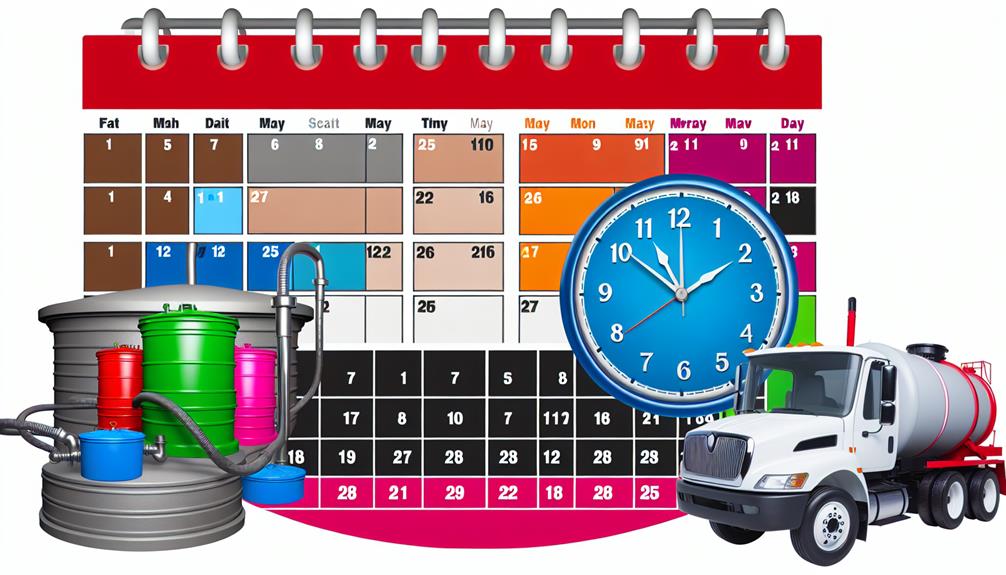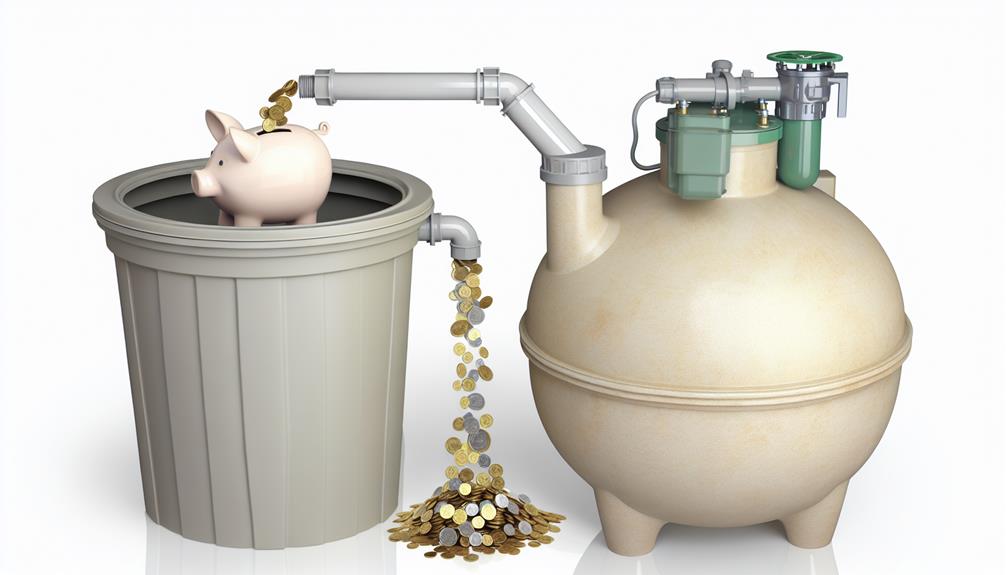Discover how to protect your septic system from breakdown with...
Read MoreYou & Your Septic Tank
Decoding Septic Tank Pumping: Frequency and Costs
Our professional septic service team offers comprehensive septic tank pumping services to keep your system running smoothly. Get a FREE Quote Today.

Decoding Septic Tank Pumping: Frequency and Costs
Sure, you’ve probably been losing sleep over the enigma that is septic tank pumping, haven’t you? But seriously, understanding the ins and outs of this essential home maintenance task is more important than you might think. As a homeowner, you’re not just responsible for the visible parts of your property; the invisible parts, like your septic tank, are equally crucial.
Knowing how often to pump your septic tank and how much it might set you back is an important aspect of homeownership that often goes overlooked. So, why not stick around to uncover this often misunderstood facet of home maintenance?
You might just save yourself from a costly and unpleasant surprise down the line.
Key Takeaways
- Regular septic tank pumping is crucial to prevent issues caused by sludge buildup and maintain system efficiency.
- Neglecting regular pumping can lead to costly septic system failures and the need for expensive repairs or replacements.
- Following the manufacturer’s recommended pumping schedule is essential for system longevity and cost-effectiveness.
- Regular inspections and professional maintenance help identify potential problems early on, save money in the long run, and ensure compliance with local regulations.
Understanding Septic Tank Basics

To understand the importance of regular septic tank pumping, you first need to grasp the basics of how a septic tank functions. A septic tank, constructed from various materials such as concrete, fiberglass, or polyethylene, is a key component of your home’s wastewater system. It’s responsible for treating and disposing of the wastewater your home produces.
The septic tank materials influence its durability and maintenance needs. Concrete tanks, for instance, are sturdy but may crack over time. Fiberglass and polyethylene tanks are more resistant to rust and corrosion but can be prone to damage from heavy weights.
Now, let’s dive into the workings of a septic tank. Your household wastewater flows into the tank, where solid waste settles at the bottom, forming a layer of sludge. The lighter waste, such as oil and grease, forms a layer of scum at the top. The middle layer is comparatively cleaner wastewater.
DIY septic maintenance involves monitoring these levels. If the sludge layer gets too thick, it can back up into the drain field, causing significant issues. That’s where regular septic tank pumping comes into play.
It’s crucial to maintain the health of your septic system.
Importance of Regular Pumping
Understanding the importance of regular septic tank pumping is crucial for homeowners. When you neglect this routine task, you’re risking a costly and inconvenient septic system failure.
Regular pumping isn’t only cost-effective but also a proactive approach to maintaining the efficiency and longevity of your system.
Preventing Septic System Failure
Regular septic tank pumping plays a crucial role in preventing system failure, maintaining its efficiency, and extending its lifespan. This is particularly true when you consider the system design and the potential failure indicators.
To clarify, here are some key points:
- System design: A well-designed septic system requires regular maintenance. Pumping at the right frequency keeps the system running smoothly.
- Failure indicators: Slow draining, bad odors, and wastewater backup are signs of a failing septic system.
- Regular pumping: This helps prevent sludge build-up which could lead to system failure.
- Maintenance schedules: Adhering to the manufacturer’s recommended pumping schedule is crucial.
- Costs: Regular maintenance can help avoid costly repairs or replacements.
Cost-effectiveness of Routine Pumping
Have you ever wondered how routine septic tank pumping can save you money in the long run? Pumping benefits are manifold and can significantly impact your overall maintenance costs.
Regularly scheduled pumping helps avoid costly repairs or replacements that can occur when solids build up and clog the system.
More importantly, routine pumping extends your septic system’s longevity. A well-maintained system can last up to 30 years, while a neglected one might need replacement in half that time, costing you thousands of dollars.
Determining Pumping Frequency

Determining the frequency of pumping your septic tank isn’t a one-size-fits-all process. It’s influenced by factors such as tank capacity and the usage rate, which you’ll need to understand to set your schedule.
Regular maintenance checks are also crucial to prevent any unforeseen problems.
Factors Influencing Pumping Frequency
In light of various factors, the frequency at which you’ll need to pump your septic tank can significantly vary.
- The type of pumping equipment used can have a massive impact on the frequency of pumping. Some equipment types are more effective than others, which can reduce the number of pumping sessions required.
- Environmental impact considerations also play a critical role. If your septic system is located near a water source or a sensitive ecological area, you might need to pump your tank more frequently to prevent contamination.
- The size of your septic tank is another significant factor. Larger tanks can hold more waste, hence requiring less frequent pumping.
- The number of people in your household influences how quickly your tank fills up. More people mean more waste, thus more frequent pumping.
- Lastly, your water usage habits can affect the pumping frequency. If you use a lot of water, your tank is likely to fill up faster.
Understanding Septic Tank Capacity
Given these various factors, gaining a solid understanding of your septic tank’s capacity becomes crucial in accurately determining the pumping frequency. The capacity of your septic tank is dependent on factors like tank materials and installation challenges.
Consider the following table:
| Factors | Effect on Septic Tank Capacity |
|---|---|
| Tank Materials | Different materials (concrete, plastic, fiberglass) have diverse capacities. |
| Installation Challenges | Difficult terrain or limited space can restrict tank size. |
| Household Size | A larger household typically requires a bigger tank. |
| Water Usage | Higher water consumption can fill a tank faster. |
Understanding these factors will help you gauge your tank’s capacity and, in turn, its pumping needs. With a firm grasp of your septic tank’s capacity, you’ll be better equipped to manage and maintain it effectively.
Schedule Regular Maintenance Checks
To ensure your septic tank operates optimally, it’s essential to schedule regular maintenance checks which will help you establish the appropriate pumping frequency. Maintenance checks offer several benefits and are a necessity for the longevity of your tank.
Here are some maintenance benefits:
- *Prevention of overflows*: Regular inspections can identify potential issues before they escalate.
- *Cost-effective*: It’s cheaper to maintain than to replace a septic tank.
- *Enhanced longevity*: Regular maintenance extends your tank’s lifespan.
- *Promotes health*: Prevents contamination of your property and local water sources.
- *Efficiency*: A well-maintained septic system functions optimally.
Factors Influencing Pumping Schedule

Your septic tank’s pumping schedule depends on several factors, including tank size, household size, and the amount of wastewater generated. Two less obvious but equally crucial elements to consider are tank composition and soil type.
The tank composition plays a significant role in determining the frequency of pumping. Concrete tanks are durable and can typically go for longer periods without needing a pump-out. On the other hand, plastic tanks might require more frequent servicing due to their susceptibility to damage.
Soil type also influences your septic tank pumping schedule. For instance, if your property has fast-draining sandy soil, your septic system may need less frequent pumping. Conversely, clay or silty soils that drain more slowly may necessitate more regular maintenance to prevent overflows and system failures.
In addition to these factors, the efficiency of your household fixtures and appliances can influence the frequency of pumping. High-efficiency appliances generate less wastewater, reducing the strain on your septic system and potentially extending the time between pumpings.
Estimated Costs of Septic Services
Understanding the estimated costs of septic services is a crucial aspect of managing your home’s wastewater system. Prices typically vary based on the size of your septic tank and the complexity of the pump-out process. Here’s a simplified breakdown of the costs:
- Basic Septic Services: The cost for a standard pump-out ranges from $200 to $500. However, the frequency of pumping can affect the overall annual cost.
- Septic System Upgrades: Upgrades can cost anywhere from $6000 to $12000, depending on the complexity and size of the system.
- Emergency Services: Unexpected issues can result in costs upwards of $1000, especially if you need immediate assistance.
- Inspections: Regular inspections are essential, usually costing around $100 to $200. They can help you avoid bigger, costlier problems down the line.
- DIY Maintenance Risks: Trying to save money with DIY maintenance can lead to risks, including damaging your system or violating local regulations. These risks can result in hefty fines or repair costs.
Money-Saving Tips for Septic Maintenance

While managing expenses for your septic system may seem daunting, there are practical strategies you can adopt to save money on septic tank maintenance. One approach is DIY septic care. You can save considerably by learning basic septic system maintenance. This can include routine checks and simple repairs.
Eco-friendly alternatives are another excellent option. These alternatives often reduce the frequency of pumping, thus saving you money in the long run. For instance, using biodegradable soaps can help maintain the balance of your septic system.
Consider this table for some more tips:
| Tips | Method | Saving Potential |
|---|---|---|
| DIY Septic Care | Perform basic checks and repairs | Moderate |
| Eco-friendly Alternatives | Use biodegradable soaps & limit water usage | High |
| Regular Maintenance | Pump your tank as advised by professionals | High |
Don’t shy away from seeking professional advice. Regular professional inspections, although they cost upfront, can save you from costly repairs in the future. By being proactive and employing these strategies, you can effectively manage your septic system without breaking the bank.
Recognizing When Pumping Is Needed
Although it’s essential to schedule regular septic tank inspections, it’s equally crucial to recognize the signs that your tank needs pumping. Your septic system’s health implications are too significant to ignore.
There are several signs of malfunction that you can’t afford to overlook. A well-maintained septic system should be virtually unnoticeable. If you’re experiencing any of the following issues, it’s time to call in a professional:
- *Unpleasant odors*: If there are foul smells coming from your drains or around your property, it’s a clear indication your tank needs pumping.
- *Slow drains*: If sinks and showers are draining more slowly than usual, it could suggest septic tank problems.
- *Sewage backup*: This is an extreme sign that your septic tank isn’t functioning correctly.
- *Lush, green grass over the drain field*: While it might look nice, it’s often a sign of an overflowing septic tank.
- *Water pooling in the yard*: If you see water pooling around the septic tank area, it’s time to get your tank pumped.
Conclusion
In the grand scheme of home maintenance, septic pumping might seem like an insignificant task. But remember, as the old saying goes, ‘a stitch in time saves nine.’ Regular septic checks not only save you from costly repairs, but also secure your property’s long-term health.
So, don’t overlook this crucial duty. Get your septic system pumped timely and make smart savings. After all, understanding and acting on septic tank upkeep is no less than an investment in your home’s future.
You may also like...
Why Are DIY Fixes Essential for Septic Tank Pumping?
Tap into the importance of DIY fixes for septic tank...
Read MoreUnveiling the Average Costs of Septic Tank Pumping
Master the mysteries of septic tank pumping costs and avoid...
Read More
The Best Septic Tank Pumping Services Near You

Answer Some Questions
Let us know about your needs so we can find you the right septic tank pros.

Get Quotes
We will put you in touch with the right septic tank pros for your job and location.

Hire Right
Compare quotes, message or call pros, and hire only when ready.



